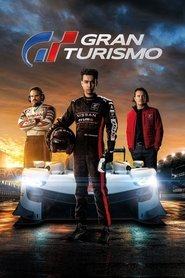What could have been benign mediocrity is instead reduced to an abominably bad piece of corporate mediocrity — a Hallmark film masquerading as an expensive blockbuster. There are characters (Orlando Bloom) who have zero motivations for their actions. Neill Blomkamp knows two tricks, and he uses them both — a lot — over the course of an overly long two hours and fifteen minutes.
Visually incoherent and edited by somebody with the attention span of a pigeon, Neill not only fails to provide context in most shots, he fails to provide context in most scenes. At one point, we thought we were watching a training montage, but realized halfway through that we were watching real races. It was unclear.
At various points, the movie aims to look like a video game, but in the most meaningless and fruitless ways possible. Entire shots look like they were filmed in the Gran Turismo video game engine. At times, Jann’s position in the race is illuminated over his car, which might be helpful if the characters weren’t constantly saying things like “you’re in fourth place, push it!”
David Harbour and Orlando Bloom both need new agents. They are better than this (particularly David Harbour, who brings such biting cynicism to the role for the first hour that he is the only reason to continue watching). As far as Neill Blomkamp, District 9 increasingly appears to be a fluke, an accidental success that has spawned a career of style seeking substance in all the wrong places.
I feel bad being this mean about the film. It’s hard to make something good. All day, I’ve been depressed about my own work. As Chamberlain would say, today the black dog bit me. There was something nice about watching something this aggressively mediocre: there is a small comfort to be found in knowing that careers have highs, lows, disappointing work, incredible successes, and everything in between. This is another low for Blomkamp, a man I desperately want to succeed even if I’m increasingly uncertain he can.
